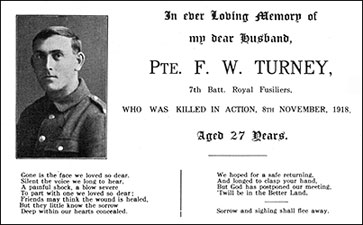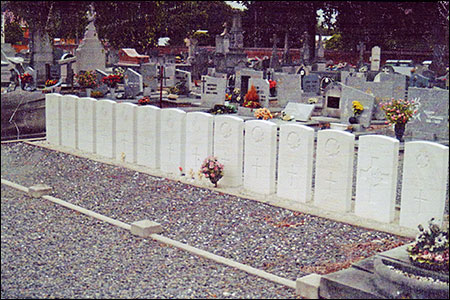Frederick William Turney 1891-1918
RESEARCH shows that the Turney lineage came to the Rushden area from the village of Slapton near Tring in Hertfordshire. The name derived from the town of Tournai in Flanders where the family originated and it was anglicised into Tornay and eventually Turney and they farmed land for many generations which was given to them by William the Conqueror for their help in the conquest in 1066.
A particularly large branch of this family moved to Northamptonshire in the late 1800s and some settled in Succoth Yard at the rear of the Chapel just off Rushden High Street before eventually moving to occupy several addresses in Crabb Street.
 |
|
Memorial card for Bill
|
Frederick William Turney, always known as Bill, eventually moved into No.40 and from there he worked as a clicker in a boot and shoe factory. After the outbreak of World War I he enlisted in Rushden into the 7th Battalion Royal Fusiliers and he saw action in Italy and France and was wounded on several occasions, once badly. While on leave in June 1915 he married Lily Cox a boot factory machinist whose family lived at 86 High Street South. They had no children.
The closing days of WWI saw some of the most ferocious fighting on the Western European front in and around Flanders. Military records show that Bill was hit in the back with a bullet and before help could reach him, another struck his head.
As a child, my weekends were often spent with my grandmother, Bill's sister Ethel, who lived at No. 17 Crabb Street, but if his name was ever mentioned I didn't hear it. But I do recall an almost tangible sombre atmosphere on Remembrance Sunday which was always listened to on the radio and in later years watched on TV, and the customary two minutes' silence was strictly observed, a tradition which still moves me today. It was only after going through my father's effects after he died did Bill's post card with his photograph came to light, until then I had no idea of his existence.
It is difficult to imagine the effect of losing an eldest son who was such a popular member of a large and loving family taken cruelly from them just three days before the end of the war.
 |
|
Dour Communal Cemetery contains 14 Commonwealth burials of the
First World War, all dating from November 1918
|
Now, 100 years on, I wonder if Bill's family would have found some solace in knowing that he was laid to rest beneath some familiar soil in the town cemetery of Dour in what is now Belgium, just a few miles away from Tournai.
I have to thank family friend Moyra Simmons for her diligent and meticulous research of Bill's family tree and army records. Neil Anderson, 2018.
|